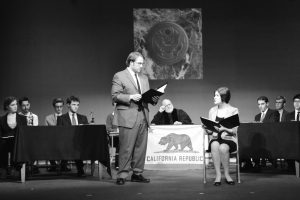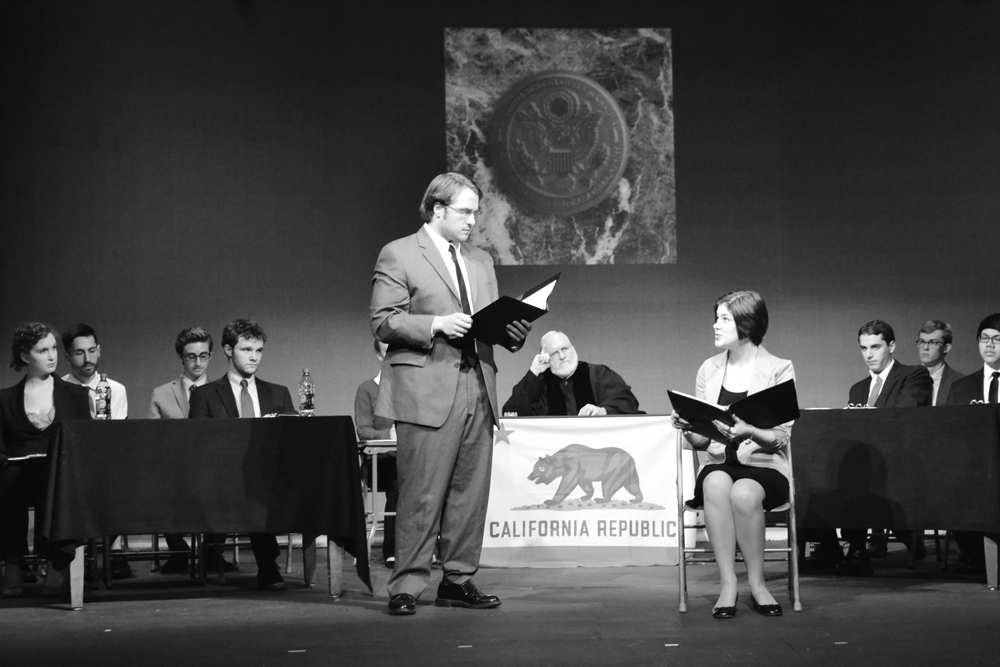
By Noah Manskar
Transcript Correspondent
Ohio Wesleyan’s production of “8,” a play about the legal battle over same-sex marriage, was revived on Sunday for a performance at Heidelberg University in Tiffin, Ohio.
Chris Tucci, director of theater at Heidelberg, said he invited the “8” company of OWU students, faculty and staff to perform after seeing videos from rehearsals for September’s OWU production online. He said he met senior Leah Shaeffer, director of “8,” when they worked together at a summer camp two years ago.
Tucci said he thought it was important to inform the Heidelberg community about same-sex marriage as it becomes a more prevalent national issue.
“If the Supreme Court doesn’t make the decision for the country, Ohio’s going to have that fight on its hands, and I wanted our students to have the opportunity to see what happened in California first hand,” Tucci said.
Shaeffer said Tucci told her he wanted the message to come from an outside perspective to show students outside Heidelberg were passionate about the issue, and “what theater could do as a political tool and as a tool for social change.”
Tucci said he knew Sunday’s performance would be different from the OWU production. Because of Heidelberg’s smaller size, abundance of first-generation college students and popularity of “traditional” majors like business and physical education, he said, there is less “diversity of thought.”
“All of your cast, they had friends and family and supporters in the audience (at the original performance),” Tucci said. “We don’t have that here. You’re going to have folks who are going to take what you say at its value and not give you any benefit of loving you right off the bat. In fact, they may be antagonistic from the beginning.”
Shaeffer said her expectations of how Heidelberg would be different were mostly met. She said Tucci told her about 10 people walked out during the performance, seemingly as a “form of resistance.”
“I am glad that we caused so much controversy that people felt the need to walk out of our theater production,” Shaeffer said.
Shaeffer said she expected Heidelberg’s environment to be less familiar than OWU, where she said the goal was to “amp up” existing support rather than changing the audience’s opinion.
“But at Heidelberg it was totally different, and I hope that we actually opened or changed some minds,” she said.
Heidelberg student Logan Burd, who attended the performance, said he didn’t think there would be a large variety of opinions among Sunday night’s audience.
“I don’t expect a lot of people to come out that aren’t really in support of what the play is representing, at least not in the numbers that I would hope so,” Burd said. “I would hope that people would be here from both sides, so it’d be fairly represented and non biased.”
The company conducted a talkback following the performance, as it did at OWU.
Shaeffer said she didn’t feel they received the hostile questions she was expecting, but that acceptance was probably because most opponents had left.
Burd said he felt both sides of the issue were presented equally in the play.
“One side clearly kind of came out on top, both in the courtroom and in, I think, the hearts of the audience,” Burd said. “But it tried to kind of portray both sides fairly.”
Shaeffer said the message of “8” is close to her personally. She said she hopes those unsure of their position on same-sex marriage were “knocked over the fence” after the performance, and those who oppose it “had a seed planted in their brains that might someday sprout and open it up.”
“Marriage equality is our generation’s civil rights fight, and I have every bit of faith that it will be legalized nationwide in my lifetime,” Shaeffer said. “But I would prefer it to be sooner rather than later so that I can marry my girlfriend in the next five years, which is probably unrealistic, but I would like our relationship and the relationship of every gay couple who wants to consider themselves married to be valid everywhere in this country.”
